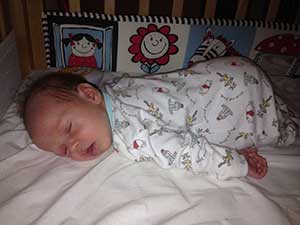Sleep Matters
18th June 14
In our last blog we wrote about new babies in families and ways in which to help settle older children with the changes that a sibling can bring. Whilst thinking of all the ways the family dynamic can change, one subject came up time and time again.
Lost Sleep
A new baby typically results in 400 – 750 hours lost sleep to its parents each year. A portion of this can also go for their siblings; even if the older child is in a room at the far end of the house and is not within sight or sound of the baby, their own feelings and worries can keep them awake or cause them to wake during the night.
New baby or not, sleep is the most important in all of a child’s routines with children typically needing between 11 & 13 hours sleep each night. Having a number of Early Years specialists at school (Early Years is where young children go through the largest developmental changes) the unanimous feedback is that in primary aged children the biggest gift they can be given is good sleep. This is how one member of staff explained it:
“We all know what it’s like to work when you haven’t had enough sleep. Imagine what that’s like for a child who is not getting enough sleep on a daily basis, trying to run around, work, concentrate, regulate their behaviour and manage their feelings. As well as putting enough fuel in their bodies as we all know how hard it is to eat when tired.”
Everybody processes what has happened during their day, what they have learnt, interactions they have had, etc, when they are asleep. The more sleep a person has, the more able they are to process everything and feel more settled in the days ahead. With sleep being such a precious commodity in this day and age it is unsurprising to learn that humans can survive longer without food than they can without sleep.
Signs that your child is not getting enough sleep can include:
- Moodiness
- Behaviour problems, this can be caused by as little as 30 – 60 minutes less sleep than needed.
- Trouble thinking, lack of attention, staying organised and remembering things.
- Falling asleep during the day.
- Weight problems
- Waking during the night.
How you can help your child to sleep well:
- Keep your child’s daytime schedule regular. Children are creatures of habit and feel most secure when they know the structure of their week.
- Create a bedtime routine that includes bedtime stories.
- Make sleep a priority, plan your evening around bedtime rather than bedtime being an incidental part of your day.
- Children can be natural worriers, don’t let them go to bed with unresolved issues.
- Turn off electronic equipment long before bedtime.
- Avoid caffeine including chocolate and energy drinks.
- Keep televisions and other stimulating, backlit equipment out of the bedroom.
- Make your child’s bedroom a quiet, calm environment.
For those of you with children aged 7+ the sleep for kids website has some wonderful resources for parents and children to explore all things sleep related.

